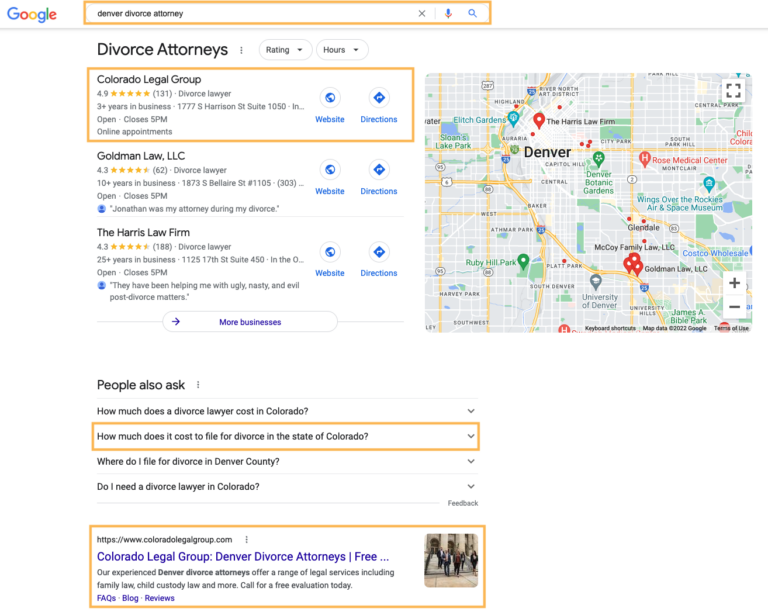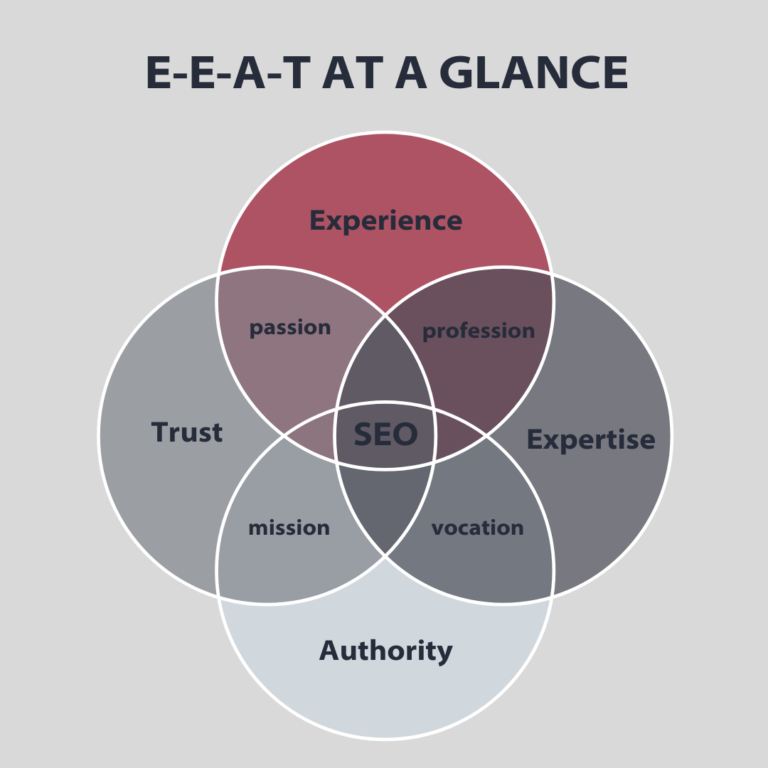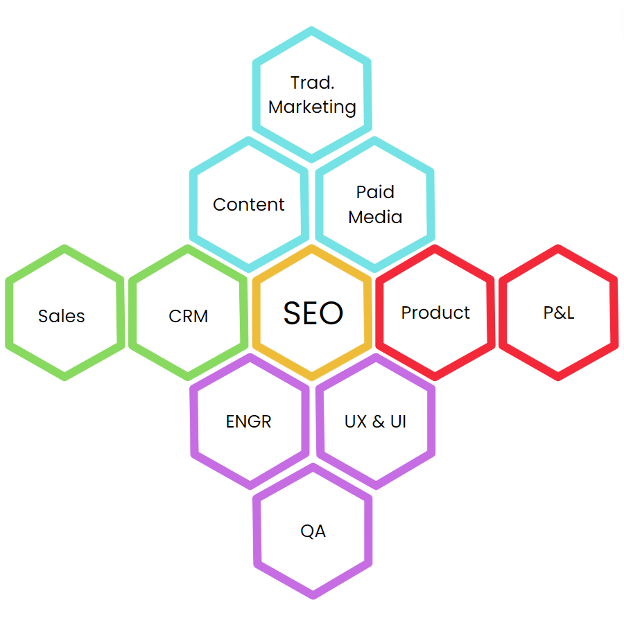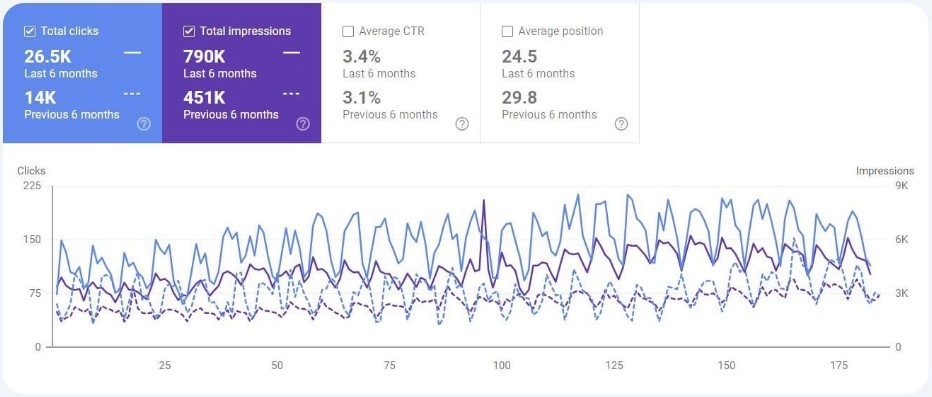Comprehensive Guide To Search Engine Optimization for Divorce Attorneys
How you can turn your law firm website into a powerhouse of information so that Google’s search crawlers prioritize you over competitors.
Introduction to Search Engine Optimization for Divorce Attorneys
Divorce and family law is a highly competitive area of legal expertise. By leveraging search engine optimization, commonly referred to as SEO, attorneys can beat out competitors in their local markets and gain the clientele they’ve been hoping for. Search engine optimization in itself is not a tool, it’s a convoluted strategy that involves various aspects of your digital presence. Some of those aspects are your title tags, meta tags, on-page content, site speed, user experience, link-building initiatives, off-page strategies, technical fixes, plug-in maintenance, and so much more. When search engine optimization is done right, you can reap exponential benefits for years to come, and it’s a reason why so many lawyers choose this avenue. Even if you pause search engine optimization after a year or two of ranking, you’ll still be rewarded in traffic and conversions until other competitors come in and take over your rankings.
When search engine optimization is done incorrectly, you will truly find yourself in the belly of the beast (Google). Websites that are old or poorly designed, or not ADA compliant, metadata that has been “skimmed” over, lack of transparent data reporting, and more are all indicators of poor search engine optimization services. Especially in the event your website isn’t ADA compliant, that sets business owners up for hefty lawsuits that are easily avoided — and crawlers love ADA compliance.
The Importance of Search Engine Optimization for Divorce Lawyers

Unlike traditional marketing methods, search engine optimization targets potential clients who are actively searching for legal services online, making it a highly effective way to connect with individuals in need of legal assistance for divorce. When it comes to search engine optimization strategy for divorce lawyers, having a game plan is necessary to bring on the qualified leads and overall success you seek. Search engine optimization campaigns need to be methodical and well-researched to ensure you’re exceeding the status of competitor content quickly.
From local map packs, quality content, site performance and more — there’s a highly strategic digital eco-scape you’ll need to conquer in order to appear in front of your desired audience — people seeking your services so they can navigate their divorce and all its struggles with ease.
Here are the Benefits of Investing in Search Engine Optimization
1. Visibility and Online Presence
The legal industry is highly competitive, and divorce lawyers must ensure they stand out in search engine results. A well-crafted search engine optimization strategy helps improve your website’s visibility, ensuring it appears prominently in search engine results for relevant queries. This increased visibility means potential clients are more likely to find and visit your site, thus increasing the chances of engagement.
2. Targeted Traffic
Search engine optimization allows you to attract targeted traffic—individuals who are specifically searching for divorce-related legal services. By optimizing your website with relevant keywords like “contested divorce,” “property division,” and others, content, and metadata, you ensure that your site appears when potential clients search for terms like “divorce lawyer near me,” “family law attorney,” or “child custody lawyer.” This targeted approach brings in leads that are more likely to convert into clients.
“Implementing a strategic search engine optimization plan is essential for any divorce lawyer aiming to grow their practice. By optimizing your online content, you ensure that you’re reaching the right audience at the right time, making it easier for those in need of your services to find you.” — Kirsten Hall, Legal SEO Expert
3. Authority and Trust Building
A strong search engine optimization strategy involves creating high-quality, informative content that addresses the concerns and questions of your potential clients and is so valuable that credible websites backlink to your content. By providing valuable insights and legal guidance through blog posts, articles, and FAQs, you establish your practice as an authority in the field and to crawlers by essentially becoming a “digital library” that media outlets can refer to. This not only helps with SEO rankings but also builds trust with your audience, making them more likely to choose your services over competitors.
4. Competitive Advantage
In the crowded field of divorce law, staying ahead of competitors is crucial. An effective search engine optimization strategy involves regularly analyzing and staying updated with the latest search engine optimization trends and competitor activities. By doing so, you can identify gaps in your competitors’ strategies and capitalize on them, ensuring that your content and services are more accessible and appealing to potential clients.
“Search engine optimization is the cornerstone of digital marketing for any business, including legal practices. It’s not just about getting to the top of search results; it’s about creating a sustainable online presence that drives qualified leads and builds trust with potential clients.” — Brent Harkins, CMO
5. Cost-Effectiveness
Compared to traditional advertising methods, search engine optimization is a cost-effective marketing strategy. While it requires an investment of time and resources upfront, the long-term benefits of a well-executed search engine optimization campaign are substantial. Once your website starts ranking well for targeted keywords, you can enjoy a steady stream of organic traffic without the ongoing costs associated with pay-per-click (PPC) advertising.
6. Local SEO Focus
For divorce lawyers, local SEO is particularly important. Potential clients often search for legal services within their vicinity. Optimizing your website for local search terms, creating a Google Business Profile, and encouraging client reviews can significantly enhance your local online presence. This makes it easier for local clients to find and contact you, driving more foot traffic to your practice.
“As a CEO & Managing Attorney, I understand that search engine optimization is more than just a marketing strategy; it’s an investment in the future of our legal practice. Effective local SEO not only enhances our visibility but also positions us as leaders in the field, ensuring that clients recognize our expertise and trust our services.” — David Crum, CEO
7. Continuous Improvement and Adaptation
SEO is not a one-time effort but a continuous process of improvement and adaptation. Regularly updating your website with fresh content, optimizing for new keywords, and adapting to changes in search engine algorithms are essential for maintaining and improving your rankings. By staying proactive and responsive to search engine optimization developments, you ensure sustained growth, stability, and success for your practice.
Search Engine Optimization Best Practices for Family Law Firms
For family law practitioners, a well-implemented search engine optimization strategy is crucial to outshining competitors and attracting clients in need of legal services. Here are some best practices to ensure your search engine optimization efforts are effective:
1. Run a Site Audit
A comprehensive site audit is the first step to identifying and addressing any issues that could hinder your search engine optimization performance. This involves checking for broken links, ensuring your site is mobile-friendly, verifying that your pages are indexed correctly, and confirming that your site is ADA-compliant. Regular audits help maintain the health and functionality of your website, making it more attractive to search engines and users alike.
2. Run a Site Speed Optimization Test
Site speed is a critical factor in both user experience and SEO rankings. Slow-loading websites can frustrate visitors, leading to higher bounce rates and lower engagement. Use tools like Google PageSpeed Insights to test your site’s speed and identify areas for improvement, such as optimizing images, leveraging browser caching, and minimizing JavaScript.
3. Perform Keyword Research
Keyword research is the foundation of any successful SEO strategy. Identify the search terms and phrases that potential clients use when looking for family law services. Tools like Google Keyword Planner, SEMrush, and Ahrefs can help you discover high-traffic, low-competition keywords relevant to your practice. Focus on a mix of broad and long-tail keywords to cover various aspects of your services.
4. Use Relevant Keywords in the Metadata
Once you have identified the right keywords, ensure they are strategically placed in your website’s metadata, including title tags, meta descriptions, and header tags. This helps search engines understand the content of your pages and improves the likelihood of ranking higher for relevant search queries. For example, use keywords like “divorce lawyer,” “family law attorney,” and “child custody lawyer” in your metadata.
5. Write Extensive, Transparent Long-Form Content
High-quality, long-form content that is informative and transparent can significantly boost your SEO efforts. Create detailed blog posts, articles, and guides that address common questions and concerns of your potential clients. By providing valuable insights and practical advice, you establish your practice as an authority in family law, which not only helps with SEO but also builds trust with your audience.
6. Ensure Website Images Are Size-Optimized
Large image files can slow down your website, negatively affecting user experience and search rankings. Ensure that all images on your site are properly optimized for size without compromising quality. Use compression tools and choose the right file formats (such as JPEG for photographs and PNG for graphics) to enhance load times.
How Divorce Attorneys Can Master Search Engine Optimization
One of the issues we regularly see in our site audits is the overcompensating of keyword injection, which is more formally known as “keyword stuffing” to SEOs. This is noticed when a single webpage of content might have a title tag of:
Divorce, Child Custody, Family and Property Division Lawyers in Denver
Well, which is it? Is the content on this page focused on divorce, child custody, family lawyers, or property division? Surely, an attorney who practices in these areas might think that this approach is a solid approach to rank for all these keywords. However, imagine you’re back in an academic setting; Google is your discerning professor, and this webpage is a carefully crafted essay. Google would ask you, “Why did you dilute your thesis with so many disparate themes?” Just as an essay with too many unfocused arguments loses its clarity and impact, mixing too many unrelated topics on a webpage can diminish its effectiveness and coherence.
Local & Service-Based Keywords
It is crucial to attack geographical and service-targeted content first because you want to build that local presence with crawlers. Since you serve people locally, you need to let them and crawlers know where you are consistently (without overdoing it). Now there are obvious ways to do this by updating the title tags and meta descriptions, but there are other, more intense ways to present geographic coordinates inside of your website’s schema. Doing so allows you to begin popping for keywords like “divorce lawyer in [city name]” or “divorce attorney near me,” — and this is a solid piece of information that has made a world of difference to our clients when increasing traffic and lead generation.
Maximize SEO Opportunity
When you have a keyword strategy in place alongside your content, you’re setting yourself up for success in getting the leads you want. Take some time to consider who you want to reach, because keywords like “property division,” “child custody lawyer,” and “contested divorce” will yield more qualified leads over time. Broader keywords like “alimony,” “divorce,” and “child support” will bring in more leads, but there’s a higher chance the leads will require a little more sifting to determine where they qualify. Also, those broad keywords are way more competitive. Knowing what to tackle is something the team at US Legal Marketing Group specializes in, so you can focus on growing your law firm.
The Role of Keyword Density in Optimizing Search Engine Optimization
Keyword density refers to the percentage of times a keyword or phrase appears on a web page compared to the total number of words on that page. It is one of the many factors considered in SEO (search engine optimization) to help improve a web page’s ranking in search engine results. Here’s a detailed look at the role of keyword density in optimizing search engine optimization:
Historical Importance
In the early days of search engine optimization, keyword density was a crucial factor. Search engines primarily relied on keyword frequency to determine the relevance of a page to a particular search query. A higher keyword density was often associated with better rankings.
Modern Search Engine Optimization Practices
Today, keyword density is still relevant, but its importance has diminished significantly. Search engines like Google have evolved and now use sophisticated algorithms that consider a multitude of factors beyond keyword density. Here’s how keyword density fits into modern search engine optimization:
1. Relevance Indicator
Keyword density can still be an indicator of relevance. A certain level of keyword presence is necessary to signal to search engines that the content is about a specific topic. However, there is no ideal or universally accepted keyword density percentage that guarantees better rankings. That said, our recommendation is usually within the range of 1-2% for an “exact match” (or your target keyword) and 4-8% for “phrase match” keyword density usage. The focus should be on natural and meaningful use of keywords.
2. Avoiding Keyword Stuffing
Overuse of keywords, known as keyword stuffing, can lead to penalties from search engines. Search engines now prioritize user experience, and content that appears spammy or manipulative is likely to be downgraded. It’s crucial to use keywords naturally within the context of high-quality content.
3. Context and Semantic Search
Modern search engines use Latent Semantic Indexing (LSI) and other technologies to understand the context and meaning of content. They look for related terms and synonyms, rather than just the repetition of specific keywords. This means content should be comprehensive and cover related subtopics naturally.
4. User Experience and Engagement
Factors such as user engagement, time spent on the page, and bounce rate are becoming more influential. Well-written content that satisfies user intent tends to perform better. Therefore, content should be designed to meet the needs and expectations of users, rather than focusing solely on keyword density.
Best Practices for Keyword Usage
- Natural Integration: Keywords should be integrated naturally into the content. The primary focus should be on readability and providing value to the reader.
- Variety of Keywords: Use a mix of primary keywords, secondary keywords, and related terms to provide a comprehensive coverage of the topic.
- Content Quality: High-quality, informative content that engages readers is more likely to rank well. Prioritize depth and clarity over keyword repetition.
- Metadata Optimization: Include keywords in strategic places such as titles, headings, meta descriptions, and image alt texts, ensuring they fit naturally and contextually.
- Content-Length: Longer content naturally allows for more keyword usage without appearing stuffed. However, the content should remain focused and relevant.
While keyword density is not as critical as it once was, it remains a component of SEO when used appropriately (or inappropriately). The emphasis in modern search engine optimization is on creating high-quality, relevant content that meets user intent and incorporates keywords naturally. Balancing keyword usage with other search engine optimization factors, such as user experience and comprehensive content coverage, is essential for achieving better search engine rankings.
Search Engines like Google Use E-E-A-T: What Does That Mean for Family Lawyers?
E-E-A-T stands for Experience, Expertise, Authoritativeness, and Trustworthiness. It is a set of criteria used by Google’s search quality evaluators to assess the overall quality of a webpage or website. Here’s a breakdown of each component and how it can help family law firms rank better in SEO:

These Are The Key Components That Determine the Quality of Your Content to Crawlers
Experience
Expertise
Authoritativeness
Trustworthiness
How E-E-A-T Helps Family & Divorce Law Firms Rank Better
Here’s a breakdown of each component and how it can help family law firms rank better in SEO:
- Experience:
- What it Means: Demonstrating firsthand experience or direct involvement in the subject matter.
- For Family Law Firms: Sharing case studies, client testimonials, and detailed accounts of legal proceedings can showcase the firm’s hands-on experience in handling family law cases.
- Expertise:
- What it Means: Having a high level of knowledge or skill in a particular field.
- For Family Law Firms: Publishing in-depth articles, legal analyses, and educational content on family law topics can establish the firm’s lawyers as experts. Credentials, such as board certifications and years of practice, should be highlighted.
- Authoritativeness:
- What it Means: Being recognized as a leading source of information in your field.
- For Family Law Firms: Earning mentions, citations, and backlinks from reputable legal websites, industry publications, and authoritative news outlets can boost the firm’s perceived authority. Active participation in legal forums and speaking engagements can also enhance this perception.
- Trustworthiness:
- What it Means: Being reliable and providing accurate, honest information.
- For Family Law Firms: Ensuring that all content is fact-checked and up-to-date helps build trust. Displaying client reviews, having clear privacy policies, and maintaining a professional website design are also crucial.
Why Search Engines Use The E-E-A-T Ranking Method:
- Improved Content Quality: High-quality, well-researched, and authoritative content aligns with Google’s E-E-A-T guidelines, making it more likely to rank well.
- Enhanced User Trust: By demonstrating expertise, authority and building trust, family law firms can attract more clients and improve user engagement metrics, which are important for SEO.
- Better Backlink Profile: Authoritative and trustworthy content is more likely to earn backlinks from reputable sites, which is a strong ranking factor in SEO.
- Increased Visibility: Higher E-E-A-T scores can lead to better rankings in search results, increasing the firm’s visibility to potential clients searching for family law services.
We help family law firms create a robust online presence with unmatched E-E-A-T strategies that not only rank well in search engines but also instill confidence in prospective clients.
Crafting Compelling SEO Strategies for Divorce Attorneys

At US Legal Marketing Group, we specialize in developing powerful and effective search engine optimization strategies tailored specifically for divorce attorneys. Our approach combines in-depth industry knowledge with cutting-edge search engine optimization techniques to help you stand out in a competitive market.
Understanding Your Unique Needs
We recognize the unique challenges faced by divorce attorneys, such as targeting the right audience, maintaining a professional online presence, and standing out in local searches. Our team focuses on creating customized SEO strategies that address these needs, ensuring that your practice is easily found by those in need of your services.
We follow a highly strategic digital marketing approach, ensuring that not only is your SEO optimized from all angles, but that you also reap the rewards of automating your business into a true lead generation powerhouse.
Strategies for Effective Search Engine Optimization
Effective search engine optimization (SEO) involves a combination of techniques and strategies designed to improve a website’s visibility in search engine results pages (SERPs). Here are some comprehensive strategies for effective search engine optimization:
1. Keyword Research and Optimization
- Identify Relevant Keywords: Use tools like Google Keyword Planner, Ahrefs, or SEMrush to find keywords relevant to your industry and audience.
- Focus on Long-Tail Keywords: Long-tail keywords are less competitive and more specific, often leading to higher conversion rates.
- Use Keywords Strategically: Place primary keywords in critical areas such as the title tag, meta description, headings, and throughout the content, but avoid keyword stuffing.
2. High-Quality Content Creation
- Create Valuable Content: Produce content that provides value to your audience, answers their questions, and solves their problems.
- Regular Updates: Keep your content fresh and up-to-date to maintain relevance and authority.
- Content Variety: Incorporate different types of content like blog posts, videos, infographics, and podcasts to engage a broader audience.
3. On-Page SEO
- Optimize Meta Tags: Craft compelling and keyword-rich title tags and meta descriptions for each page.
- Use Header Tags: Structure your content with H1, H2, H3 tags to improve readability and search engine optimization.
- Image Optimization: Use descriptive file names and alt tags for images, and ensure they are compressed for faster loading times.
- URL Structure: Create clean, keyword-rich URLs that are easy for both users and search engines to understand.
4. Technical SEO
- Improve Site Speed: Ensure your website loads quickly by optimizing images, leveraging browser caching, and using a Content Delivery Network (CDN).
- Mobile Optimization: Make sure your website is mobile-friendly and offers a seamless experience across all devices.
- Secure Your Website: Use HTTPS to secure your site, which can improve rankings and build trust with users.
- XML Sitemap and Robots.txt: Submit an XML sitemap to search engines and use a robots.txt file to guide search engine crawlers.
5. Link Building
- Quality Over Quantity: Focus on acquiring high-quality backlinks from reputable sites in your industry.
- Guest Blogging: Write guest posts for reputable websites to build authority and earn backlinks.
- Internal Linking: Create a robust internal linking structure to help search engines crawl your site more effectively and keep users engaged.
6. User Experience (UX)
- Easy Navigation: Ensure your website is easy to navigate with a clear structure.
- Engaging Design: Use a clean, attractive design that enhances user engagement.
- Reduce Bounce Rate: Provide relevant and engaging content to keep users on your site longer.
7. Local SEO
- Google Business Profile: Create and optimize your Google Business Profile to appear in local search results and Google Maps.
- Local Citations: Ensure your business information is consistent across local directories and online listings.
- Reviews and Ratings: Encourage satisfied customers to leave positive reviews on Google and other review platforms.
8. Monitoring and Analytics
- Use SEO Tools: Employ tools like Google Analytics, Google Search Console, and Bing Webmaster Tools to monitor your site’s performance.
- Track Key Metrics: Monitor key metrics such as organic traffic, bounce rate, conversion rate, and keyword rankings.
- Regular Audits: Conduct regular SEO audits to identify and fix issues that may be affecting your site’s performance.
9. Social Media Integration
- Promote Content: Share your content on social media platforms to increase visibility, drive traffic, and attract backlinks.
- Engage with Users: Interact with your audience on social media to build relationships and encourage the sharing of your content.
10. Staying Updated
- Follow SEO Trends: Stay informed about the latest search engine optimization trends and algorithm updates by following industry blogs and forums.
- Adapt Strategies: Be ready to adapt your search engine optimization strategies in response to changes in search engine algorithms and industry best practices.
By implementing these strategies, you can create a comprehensive search engine optimization plan that enhances your website’s visibility, drives more organic traffic, and ultimately improves your search engine rankings.
Our Proven SEO Approach
Our strategy begins with thorough keyword research to identify the terms potential clients are using to find divorce attorneys. We then optimize your website’s content, structure, and technical aspects to ensure it meets search engine guidelines and user expectations. Additionally, we focus on local SEO to enhance your visibility in local search results, where most clients are looking for legal assistance.
Kirsten Hall emphasizes…
the importance of tailored search engine optimization strategies for law firms, “Understanding the specific needs and pain points of a target audience is crucial. For divorce attorneys, it’s not just about driving traffic, but attracting clients who are in genuine need of legal assistance. Crafting SEO-friendly content that speaks directly to their concerns can make a significant difference.”
Brent Harkins highlights…
the effectiveness of the Organic approach, “We don’t just apply generic SEO tactics. We understand the legal industry and the unique challenges faced by divorce attorneys from running our own practices. Our Launch & Earn™ strategies ensure higher visibility and better client engagement, leading to more successful conversions.”
Case Study: SEO Performance Enhancement for a Divorce Law Firm in Atlanta
We were engaged by a well-established divorce law firm with offices throughout the Atlanta-metro looking to enhance their online presence and attract more clients through organic search. With a strong local reputation but minimal online visibility for Atlanta’s population size, the firm sought to increase their digital footprint and rank higher for key search terms related to their practice. The US Legal Marketing Group SEO team undertook a comprehensive strategy that included in-depth keyword research, on-page and off-page optimization, and content creation tailored to the firm’s target audience. Our efforts were geared towards improving their organic search rankings and driving more relevant traffic to their website.
The results were remarkable. More significantly, we successfully achieved top 3 organic rankings for high-intent keywords such as “child custody attorney,” “divorce lawyer,” and “family attorney” in their most lucrative market of Alpharetta, Georgia. This dramatic improvement in their search engine optimization performance not only enhanced their online visibility but also led to a substantial increase in client inquiries and new cases. The firm’s growth and success underscore the effectiveness of US Legal Marketing Group’ tailored search engine optimization strategies in transforming and expanding a legal practice’s reach and client base through organic search.
6 Months vs. Previous 6 Months // Dec ‘23 – May ‘24 vs. Dec ‘22 – May ‘23
Year over year in a 6 month comparison period, we increased their website clicks from 14,000 to 26,500, a rise of nearly 90%, and their impressions from 451,000 to 790,000, an increase of over 75%.

How Growth Looked During a 12-Month Period: Q2 ‘23 – Q2 ‘24
The Firm’s click traffic had more than doubled, going from an average of 100 clicks per day to 200 clicks per day.

March – May ‘24 vs. March – May ‘23 YOY Growth
For a shorter period of coverage between March and May, YOY clicks increased from 6,970 to 14,500, this represents a 108% increase in traffic.

Essential Search Engine Optimization Metrics for Family Law Firms
Tracking and analyzing the right search engine optimization metrics is crucial for family law firms to understand the effectiveness of their online marketing strategies and make informed decisions. Here are some essential search engine optimization metrics that family law firms should monitor to ensure their search engine optimization efforts are yielding the desired results:
1. Organic Traffic
Organic traffic refers to the number of visitors who come to your website through unpaid search results. Monitoring this metric helps you understand how well your website is performing in search engine rankings and how effectively it attracts potential clients.
2. Keyword Rankings
Tracking the rankings of your targeted keywords is vital to gauge the visibility of your website in search engine results pages (SERPs). For family law firms, it’s important to rank well for specific terms like “divorce lawyer,” “child custody attorney,” and “family law firm near me.”
3. Click-Through Rate (CTR)
CTR measures the percentage of people who click on your website link after seeing it in the search results. A higher CTR indicates that your title tags and meta descriptions are effectively attracting searchers’ attention.
4. Bounce Rate
Bounce rate represents the percentage of visitors who leave your website after viewing only one page. A high bounce rate may indicate that your content isn’t meeting visitor expectations or that your site’s user experience needs improvement.
5. Conversion Rate
Conversion rate is the percentage of visitors who take a desired action on your site, such as filling out a contact form or scheduling a consultation. This metric is crucial for family law firms as it directly correlates with lead generation and client acquisition.
6. Average Session Duration
This metric shows the average amount of time visitors spend on your website. Longer session durations typically indicate that your content is engaging and valuable to your audience.
7. Pages Per Session
Pages per session indicate how many pages a visitor views during a single visit. Higher numbers suggest that users find your site useful and are exploring multiple pages, which can increase the chances of conversion.
8. Backlinks
Backlinks are links from other websites to your site. They are a significant factor in SEO as they help to build your site’s authority and improve its search engine rankings. Quality matters more than quantity, so focus on acquiring backlinks from reputable sites.
9. Local Search Metrics
For family law firms, local SEO is critical. Track metrics like local map pack rankings, Google Business Profile analytics, and local citation consistency to ensure you’re visible to potential clients in your geographic area.
10. Mobile Usability
With an increasing number of users searching for services on mobile devices, it’s essential to track your site’s mobile performance. Ensure that your site is mobile-friendly and provides a good user experience across all devices.
The Future of SEO for Family law Firms
As digital marketing continues to evolve, family law firms must stay ahead of emerging trends in search engine optimization to maintain a competitive edge and effectively attract clients. One significant trend is the increasing use of artificial intelligence (AI) and machine learning technologies in SEO strategies. These tools can analyze vast amounts of data to predict user behavior, optimize content for search engines, and provide personalized user experiences, leading to higher search rankings and better client engagement.
Additionally, the integration of Google’s Gemini project promises to transform SEO practices. Gemini’s advanced AI capabilities aim to enhance the accuracy and relevance of search results, which means family law firms must focus on creating high-quality, authoritative content that meets these new standards. Leveraging Gemini’s insights can also provide deeper understanding of search trends and user behavior, allowing for more strategic and data-driven SEO efforts.
The challenge of combating AI-generated content is another crucial aspect. As AI tools become more capable of producing content, family law firms must emphasize quality and authenticity in their content to stand out. This includes producing in-depth guides, case studies, and expert commentaries that AI cannot easily replicate. Incorporating a human touch through personal insights and client testimonials will also be essential to differentiate from AI-generated material.
Local SEO and hyper-local targeting will continue to be vital for family law firms, particularly for those serving specific geographic areas. Optimizing Google Business Profiles, creating localized content, and ensuring consistency across local directories will help improve visibility and attract relevant traffic.
Mobile-first indexing and user experience remain key factors in SEO. With Google’s emphasis on mobile-first indexing, ensuring a seamless mobile experience is crucial. This includes responsive design, fast loading times, and an intuitive user interface to enhance user satisfaction and improve search rankings.
Lastly, multimedia content, especially video, will be prominent in advanced search engine optimization strategies. Videos can effectively convey complex legal concepts, build trust, and engage potential clients. Platforms like YouTube and social media are ideal for deploying video content to enhance online presence and attract clients.
By keeping an eye on these trends and incorporating them into their SEO strategies, family law firms can enhance their online presence and continue to attract and convert clients effectively in a rapidly changing digital landscape.
How We've Overcome Google's Recent Q2 Updates in 2024 with a Quality SEO Sprint



+38% Leads M/M
63% Call Increase
+9% Leads Y/Y
20% Form Increase
Why Choose US Legal Marketing Group?
Our commitment to excellence and our deep understanding of the legal industry set us apart. By partnering with us, you’ll benefit from:
- Targeted Keyword Optimization: Ensuring your practice appears in searches relevant to divorce law so you can increase lead generation.
- High-Quality Content Creation: Crafting informative and engaging content that resonates with potential clients and compels a conversion.
- Local SEO Expertise: Enhancing your visibility in local search results, driving more relevant traffic to your site from potential clients nearby.
- Continuous Monitoring and Improvement: Regularly assessing and refining your SEO strategy to adapt to changing search engine algorithms and market trends.
There’s Only One Firm Per City
Due to the nature of our SEO marketing, we do not have any overlap in markets. That means the sooner your firm signs with us, the sooner you guarantee your competition can’t use our Launch and Earn™ campaigns or materials.
Work With US Legal Marketing Group, A Data-Driven Family Law Firm Marketing Agency
By partnering with US Legal Marketing Group, your divorce law firm can harness the power of advanced search engine optimization strategies developed by legal professionals for legal professionals. Experience the difference that expert-led marketing can make in transforming your practice and achieving extraordinary growth.